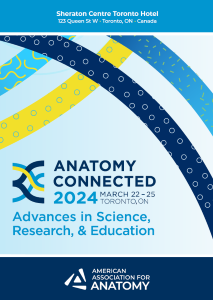Anatomy Education: Teaching Methods & Innovations Posters
Poster: Anatomy Education: Teaching Methods & Innovations Posters
168 - Tissues and the Skin Content Reinforcement Improves Short-term Anatomical Knowledge Retention in Nursing Students
Saturday, March 23, 2024
5:00pm - 7:00pm US EDT
Location: Sheraton Hall
Poster Board Number: 168
There are separate poster presentation times for odd and even posters.
Odd poster #s – first hour
Even poster #s – second hour
Co-authors:
There are separate poster presentation times for odd and even posters.
Odd poster #s – first hour
Even poster #s – second hour
Co-authors:
Sarah Cuschieri - Senior Lecturer, Department of Anatomy, Faculty of Medicine & Surgery, University of Malta

Raj Narnaware, BSc, MSc, PhD
Associate Professor
MacEwan University
MacEwan University
Edmonton, Alberta, Canada
Presenting Author(s)
Abstract Body : Mounting evidence shows that anatomy students in medical and allied health disciplines struggle to transfer first-year anatomical knowledge to their future years of theory and clinical (Narnaware and Neumeier, 2020). Evidence shows that many interventional strategies have been introduced to mitigate the knowledge gaps between first-year theory and the subsequent years of these disciplines. For nursing education, limited interventional strategies have been incorporated for limited organ systems to improve long-term knowledge retention in nursing students. We have previously shown that nursing students lose anatomical knowledge by 33.5% in the second year, 31.8% in the third year and 29.6% in the fourth year (Neumeier and Narnaware, 2023). To mitigate knowledge loss, various interventional strategies have previously been evaluated (Narnaware and Cuschieri, 2023). The present study aims to evaluate the repeated assessment of anatomical knowledge of the body’s tissues and skin as one of the interventional strategies. Approximately 75-80 first-year students were quizzed on the body’s four primary tissues and skin using the online game-based quizzing system Kahoot! Each Kahoot quiz included 7-9 multiple-choice questions. New sets of questions were used for each week’s Kahoot quiz throughout 8 weeks of study. Data were statistically analyzed using SPSS II, and means were compared using 2-sample t-tests. The scores are described as the mean and standard deviation (SD) and are presented in Table 1 and Figure 1. Statistical significance was set at P < 0.05 for all tests. Compared to week 1, repeated knowledge testing of tissues showed a slight increase in knowledge retention in week 2 (9.5%) and week 6 (9.9%), but it significantly increased in week 3 (24.1%). Whereas at week 4 and week 8, it increased by 14.9% and 15.5% compared to week 1 (Table 1 and Fig.1). For the skin, repeated evaluation of knowledge yielded different retention levels. Compared to week 1, knowledge retention was increased by 15.6% in week 2 and 10.5% in week 4. However, knowledge retention in week 3 increased by 3.2% and in week 6 by 1.7% (Table 1 and Figure 1). The higher retention in week 3 for the tissues and week 4 for the skin may be due to students reading the tissues and skin for the midterm exams. Although organ system-specific changes in knowledge retention were found, the study results show that nursing students were able to retain the knowledge of the tissues and the skin over eight weeks and had better knowledge retention of the tissues than the skin after eight weeks of assessment, which are consistent with our previous study in musculoskeletal content reinforcement (Narnaware et al., 2023). Content reinforcement should be used as one of the interventional strategies to improve knowledge retention in nursing students.

